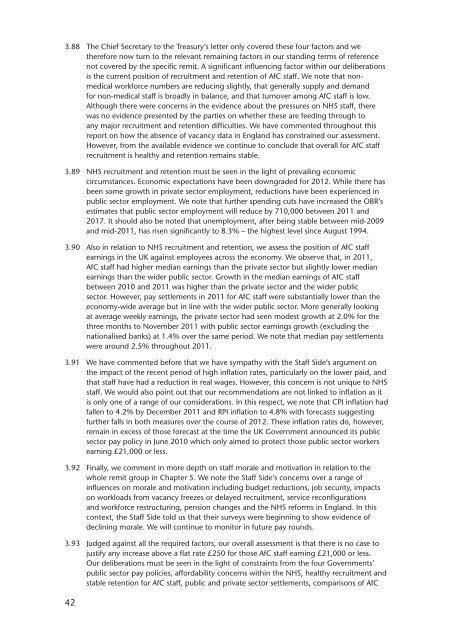NHS pay review body: twenty-sixth report 2012 - Official Documents
NHS pay review body: twenty-sixth report 2012 - Official Documents
NHS pay review body: twenty-sixth report 2012 - Official Documents
Create successful ePaper yourself
Turn your PDF publications into a flip-book with our unique Google optimized e-Paper software.
3.88 The Chief Secretary to the Treasury’s letter only covered these four factors and we<br />
therefore now turn to the relevant remaining factors in our standing terms of reference<br />
not covered by the specific remit. A significant influencing factor within our deliberations<br />
is the current position of recruitment and retention of AfC staff. We note that nonmedical<br />
workforce numbers are reducing slightly, that generally supply and demand<br />
for non-medical staff is broadly in balance, and that turnover among AfC staff is low.<br />
Although there were concerns in the evidence about the pressures on <strong>NHS</strong> staff, there<br />
was no evidence presented by the parties on whether these are feeding through to<br />
any major recruitment and retention difficulties. We have commented throughout this<br />
<strong>report</strong> on how the absence of vacancy data in England has constrained our assessment.<br />
However, from the available evidence we continue to conclude that overall for AfC staff<br />
recruitment is healthy and retention remains stable.<br />
3.89 <strong>NHS</strong> recruitment and retention must be seen in the light of prevailing economic<br />
circumstances. Economic expectations have been downgraded for <strong>2012</strong>. While there has<br />
been some growth in private sector employment, reductions have been experienced in<br />
public sector employment. We note that further spending cuts have increased the OBR’s<br />
estimates that public sector employment will reduce by 710,000 between 2011 and<br />
2017. It should also be noted that unemployment, after being stable between mid-2009<br />
and mid-2011, has risen significantly to 8.3% – the highest level since August 1994.<br />
3.90 Also in relation to <strong>NHS</strong> recruitment and retention, we assess the position of AfC staff<br />
earnings in the UK against employees across the economy. We observe that, in 2011,<br />
AfC staff had higher median earnings than the private sector but slightly lower median<br />
earnings than the wider public sector. Growth in the median earnings of AfC staff<br />
between 2010 and 2011 was higher than the private sector and the wider public<br />
sector. However, <strong>pay</strong> settlements in 2011 for AfC staff were substantially lower than the<br />
economy-wide average but in line with the wider public sector. More generally looking<br />
at average weekly earnings, the private sector had seen modest growth at 2.0% for the<br />
three months to November 2011 with public sector earnings growth (excluding the<br />
nationalised banks) at 1.4% over the same period. We note that median <strong>pay</strong> settlements<br />
were around 2.5% throughout 2011.<br />
3.91 We have commented before that we have sympathy with the Staff Side’s argument on<br />
the impact of the recent period of high inflation rates, particularly on the lower paid, and<br />
that staff have had a reduction in real wages. However, this concern is not unique to <strong>NHS</strong><br />
staff. We would also point out that our recommendations are not linked to inflation as it<br />
is only one of a range of our considerations. In this respect, we note that CPI inflation had<br />
fallen to 4.2% by December 2011 and RPI inflation to 4.8% with forecasts suggesting<br />
further falls in both measures over the course of <strong>2012</strong>. These inflation rates do, however,<br />
remain in excess of those forecast at the time the UK Government announced its public<br />
sector <strong>pay</strong> policy in June 2010 which only aimed to protect those public sector workers<br />
earning £21,000 or less.<br />
3.92 Finally, we comment in more depth on staff morale and motivation in relation to the<br />
whole remit group in Chapter 5. We note the Staff Side’s concerns over a range of<br />
influences on morale and motivation including budget reductions, job security, impacts<br />
on workloads from vacancy freezes or delayed recruitment, service reconfigurations<br />
and workforce restructuring, pension changes and the <strong>NHS</strong> reforms in England. In this<br />
context, the Staff Side told us that their surveys were beginning to show evidence of<br />
declining morale. We will continue to monitor in future <strong>pay</strong> rounds.<br />
3.93 Judged against all the required factors, our overall assessment is that there is no case to<br />
justify any increase above a flat rate £250 for those AfC staff earning £21,000 or less.<br />
Our deliberations must be seen in the light of constraints from the four Governments’<br />
public sector <strong>pay</strong> policies, affordability concerns within the <strong>NHS</strong>, healthy recruitment and<br />
stable retention for AfC staff, public and private sector settlements, comparisons of AfC<br />
42
















